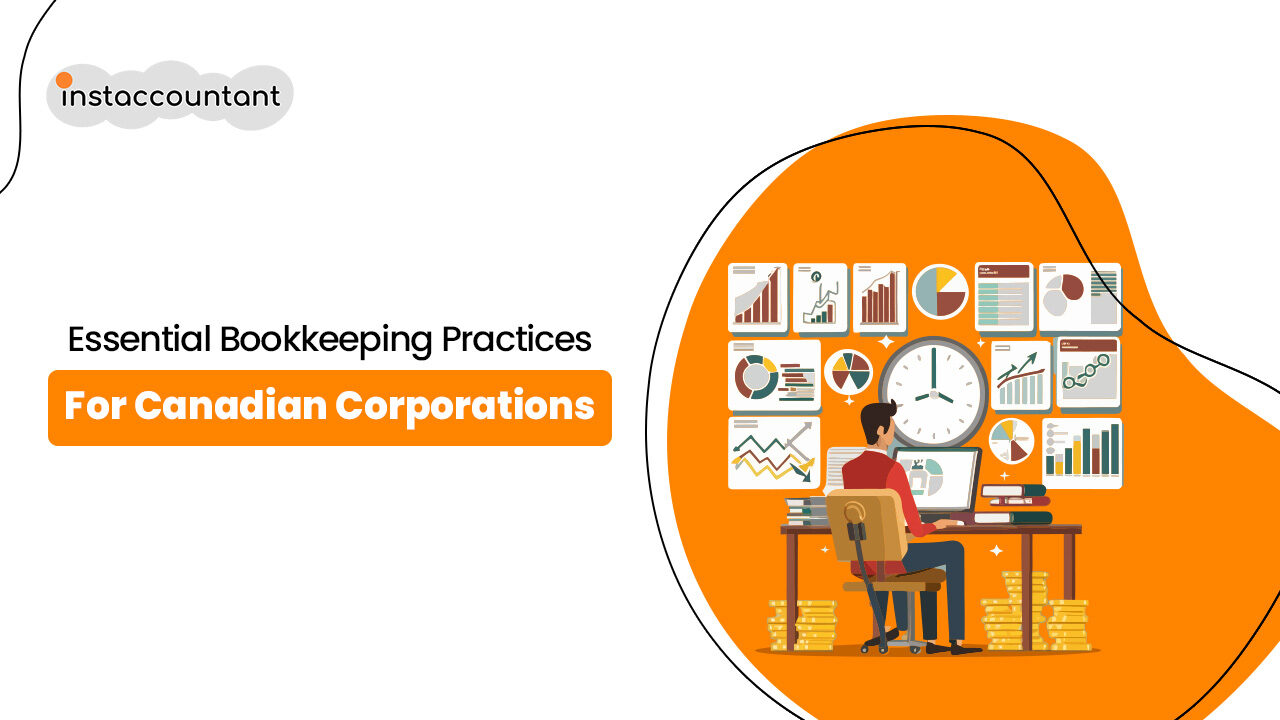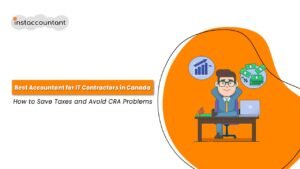Bookkeeping is the backbone of financial management for any corporation, and it becomes even more critical for Canadian corporations due to complex tax laws and regulations. Proper bookkeeping not only ensures compliance with the Canada Revenue Agency (CRA) but also provides a clear picture of a corporation’s financial health. This blog explores essential bookkeeping practices necessary for Canadian corporations to meet their tax obligations and manage their financial responsibilities effectively.
1. Understanding Tax Requirements
Overview of Canadian Tax Obligations for Corporations
Canadian corporations face various tax obligations that vary between federal and provincial jurisdictions. The primary tax is the corporate income tax, calculated based on taxable income. Key considerations include:
- Federal Corporate Tax: The general federal tax rate for 2024 is 15% on corporate income. Canadian-controlled private corporations (CCPCs) benefit from a reduced rate of 9% on the first $500,000 of taxable income.
- Provincial Corporate Tax: Rates vary by province. For example, Alberta’s small business rate is 2% on the first $500,000 of taxable income, while Ontario’s rate is 3.2%.
- Capital Gains Tax: Corporations must report capital gains and losses from the sale of assets. The tax rate on capital gains is generally half the regular corporate tax rate.
- Payroll Tax: Corporations are responsible for withholding and remitting employee contributions to the Canada Pension Plan (CPP) and Employment Insurance (EI).
Corporations must maintain accurate books to comply with these requirements, which include documenting all taxable income, tax credits, and deductions. Failing to comply with these obligations can result in penalties, interest charges, and a negative impact on the corporation’s reputation.
Key Tax-Related Bookkeeping Requirements
Corporations need to keep organized records of all financial transactions to meet tax obligations. Essential bookkeeping records include:
- Invoices: Keep copies of all sales and service invoices.
- Receipts: Save receipts for all business-related expenses for at least six years.
- Bank Statements: Regularly reconcile bank statements with bookkeeping records to identify and correct discrepancies.
These documents support tax filings and can also be crucial in the event of a CRA audit. Keeping records up-to-date and organized simplifies the process of preparing corporate income tax returns and helps corporations avoid potential errors that could lead to audits or penalties.
2. Tracking Deductible Expenses
Types of Deductible Expenses for Corporations
Identifying and recording deductible expenses accurately for Canadian corporations is crucial for reducing the overall tax burden. Canadian corporations can deduct a wide range of expenses, including salaries and wages, office supplies, business travel, and costs associated with production or service delivery. Additionally, corporations can deduct specific capital expenditures, such as machinery and equipment. However, the key lies in categorizing these expenses correctly and keeping detailed records that can substantiate the deductions during tax filing or in the event of an audit.
How to Accurately Record and Categorize These Expenses
To ensure accurate tracking of deductible expenses, corporations should implement a reliable accounting system. Best practices include:
- Utilize Accounting Software: This simplifies the process of recording and categorizing expenses.
- Regular Reviews: Categorize expenses according to CRA’s tax guidelines to ensure eligibility for deductions.
- Document Receipts: Maintain comprehensive records of all expenses, including receipts and invoices.
For example, meals and entertainment expenses are only partially deductible, so precise categorization is crucial to avoid issues during tax assessments.
3. Recording Revenue and Income
Properly Documenting All Sources of Income
All sources of income must be documented rigorously to ensure that they are reported correctly to the CRA. This includes not only the direct revenue from sales or services but also any additional income streams such as interest or dividends. Key practices include:
- Track All Income: Document every transaction to ensure completeness.
- Categorize Income Sources: Differentiating between earned income and capital gains for tax purposes.
- Use Invoicing Tools: Implement invoicing software to streamline the process and reduce errors.
Failure to accurately document income can lead to discrepancies during tax filings and potential penalties from the CRA.
Managing Different Revenue Streams
For corporations with multiple revenue streams, it is beneficial to track each source separately. By managing revenue streams effectively, corporations can make informed decisions that impact their overall business strategy, such as:
- Identifying Profitable Areas: Determine which products or services generate the most revenue.
- Allocating Resources Wisely: Direct marketing efforts to high-performing revenue streams.
- Generating Regular Reports: Monitor performance across different channels for ongoing optimization.
Effective revenue management aids compliance and provides insights for improving business operations.
4. Managing GST/HST
Understanding GST/HST Obligations for Corporations
The Goods and Services Tax (GST) and Harmonized Sales Tax (HST) present unique challenges in bookkeeping. Corporations must track the GST/HST they collect from customers and pay on purchases. This tracking enables them to claim Input Tax Credits (ITCs) and accurately report net tax. Key points include:
- Registration Required: Register for GST/HST if taxable revenues exceed $30,000.
- Tax Rates Vary: Be aware of different GST/HST rates in various provinces.
- Filing Frequency: Understand how often GST/HST returns need to be filed (monthly, quarterly, or annually).
Understanding these obligations is essential for compliance and effective financial management.
Bookkeeping Practices for Tracking GST/HST Collected and Paid
Corporations should maintain separate accounts for GST/HST collected from customers and GST/HST paid on business purchases. Recommended practices include:
- Separate Accounts: Implement systems to track GST/HST on each transaction to simplify calculations.
- Regular Reconciliation: Regularly reconcile these accounts to ensure accuracy.
- Record Transactions: Keep detailed records of all transactions involving GST/HST.
Proper bookkeeping practices will facilitate accurate reporting and ensure that the corporation can claim input tax credits where applicable.
5. Handling Capital Costs and Depreciation
Recording Capital Assets and Depreciation
Capital assets and their depreciation are significant aspects of corporate bookkeeping. Recording the purchase, usage, and depreciation of these assets allows corporations to claim appropriate capital cost allowances, which can significantly impact the tax liabilities. Important considerations include maintaining records that include:
- Purchase Price and Date: Document the initial cost and acquisition date of each asset.
- Improvements and Upgrades: Keep records of any enhancements made to capital assets.
- Depreciation Calculation: Familiarize yourself with different methods for calculating depreciation.
Depreciation allows corporations to spread the cost of an asset over its useful life, potentially leading to significant tax savings.
Claiming Depreciation and Related Deductions
Understanding the rules surrounding capital cost allowance (CCA) is vital for maximizing tax deductions related to capital assets. Best practices include:
- Consulting Tax Professionals: Seek advice to ensure compliance with Capital Cost Allowance (CCA) regulations.
- Keeping Accurate Records: Maintain detailed records of all capital assets and their depreciation schedules.
- Reviewing Claims Annually: Assess CCA claims annually to ensure maximum allowable deductions.
This not only aids in tax compliance but also enhances the corporation’s financial standing by minimizing taxable income.
6. Preparing for Tax Filings
Organizing Records for Corporate Tax Returns
Organized records are the foundation of a smooth tax filing process. Corporations should implement:
- Systematic Filing Systems: Organize documents by category (income, expenses, capital assets).
- Digital Record-Keeping: Consider using cloud-based storage solutions for easy access and backup.
- Timely Updates: Regularly update records to reflect current financial activity.
This organization will make it easier to compile information needed for tax returns and ensure compliance with deadlines.
Key Documents Needed for Tax Preparation
Key documents necessary for Corporate tax preparation include:
- T2 Corporation Income Tax Return: The primary form for corporate tax filings.
- Financial Statements: Prepare balance sheets and income statements to support tax returns.
- Supporting Schedules: Include any additional schedules that detail deductions and credits.
Having these documents organized and readily accessible simplifies the tax preparation process and reduces the risk of errors.
Working with Tax Professionals
When to Consult with Accountants or Tax Advisors
Consulting with accountants or tax advisors is crucial, especially when navigating complex tax scenarios. Consider seeking professional advice in situations such as:
- Complex Tax Situations: When dealing with mergers, acquisitions, or significant changes in business structure.
- Tax Season: Before filing to ensure all deductions are maximized.
- Legislative Changes: When new tax laws or regulations are introduced.
- International Tax Issues: For cross-border transactions involving international tax laws and treaties.
- Audit Preparation: To ensure your bookkeeping is accurate and documentation is complete for potential CRA audits.
Tax professionals can offer expert guidance, help minimize errors, and develop strategies tailored to your corporation’s unique needs, ensuring compliance and optimizing your financial outcomes.
Ensuring Compliance with Canadian Tax Laws
Regular consultations with tax professionals can help corporations stay informed about changes in tax legislation and ensure their bookkeeping practices align with current requirements. Key benefits include:
- Expert Guidance: Receive advice on best practices for tax compliance.
- Error Minimization: Reduce the likelihood of mistakes that could lead to audits or penalties.
- Strategic Planning: Develop tax strategies that optimize the corporation’s financial standing.
This proactive approach can prevent costly mistakes and enhance overall business operations.
8. Reviewing and Auditing
Regular Reviews of Tax-Related Bookkeeping Practices
Regular reviews of bookkeeping practices help ensure ongoing compliance and readiness for potential CRA audits. Corporations should:
- Schedule Assessments: Plan periodic assessments of tax-related bookkeeping to ensure accuracy.
- Engage Internal Audits: Consider internal audits to identify weaknesses and areas for improvement.
- Document Findings: Keep records of reviews and any corrective actions taken.
These reviews can identify discrepancies early on and allow for corrective measures, thereby avoiding penalties and interest.
Preparing for Potential CRA Audits
As part of their tax compliance strategy, corporations should be prepared for potential audits by the CRA. Important preparation steps include:
- Thorough Documentation: Maintain detailed records of all financial transactions.
- Organized Records: Ensure that financial records are organized and easily accessible.
- Internal Audit Readiness: Regularly conduct internal audits to prepare for any external scrutiny.
A well-prepared corporation can respond quickly to any audit inquiries, minimizing disruption and ensuring a smoother audit process.
Conclusion
In conclusion, essential bookkeeping practices are the lifeline of any Canadian corporation’s tax strategy. By ensuring accuracy, compliance, and strategic financial management, corporations can navigate the tax landscape with confidence and precision. For those seeking to deepen their understanding or require assistance, professional accountants and tax advisors remain invaluable resources in this ever-evolving field.




